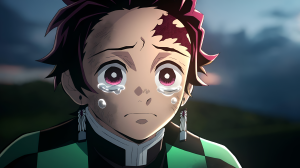Assassination Classroom is one of the most popular manga being published in Japan and the United States today. In spite of a title that might worry some parents, it’s a wholesome and endearing series focused on instilling positive values. The story follows Koro Sensei, a super-powered, octopus-like teacher, who insists on educating a classroom of middle school rejects. Koro Sensei is obliged because he has the power to destroy the Earth and tasks his students with assassinating him before the end of the school year to save the planet. This seemingly serious scenario results in lots of hijinks and a classroom experience that elevates all of his students to be their best selves.
Videos by ComicBook.com
Yūsei Matsui, the creator of Assassination Classroom traveled to America this October to visit New York Comic Con and visit Viz Media offices in San Francisco. This awarded ComicBook.Com the rare opportunity to interview a popular manga creator. Matsui dressed like a rock star at New York City, but revealed himself to be humble and delighted to see such a positive response from fans in America. We are proud to present this interview with the creator on his work in manga and focus on education.
Also, be sure to check out the image gallery at the bottom of this interview to see some pages and covers from Assassination Classroom.

ComicBook.Com: Assassination Classroom is steeped in the politics and culture of Japan, specifically Japanese school life. Were you surprised by its popularity outside of Japan?
Yūsei Matsui: Based on my understanding, the Japanese and United States school systems are completely different. Also, Americans and Japanese may see guns very differently as well. So I was thinking there is too much difference. However, since my trip here and hearing what my readers and fans like and what really landed for them, I’m learning it is more universal than I thought.
Were you nervous at all about showing gun violence in the classroom to an American audience where that has been a serious problem?
Matsui: I was ready to be completely shut down for featuring guns in my manga. I was thankful and very respectful of the American audience being open-minded and embracing my work, including that aspect.
Some of that universality might stem from the shared experience of school being central to daily life. You express some very strong opinions on how schools and teachers can better serve children in Assassination Classroom. Are you interested in new trends or methods in education?
Matsui: When I was in school, I wish there were teachers like what I imagined. That’s really what I put into Assassination Classroom. It’s my ideal world. Only if a teacher were able to move at Mach-20, could it be like this. Regarding educational trends and methods, I think you’re always going to have different student-to-teacher ratios. You’re always going to have not-so-great and great teachers. You’ll have the punks in the class. That seems to be really universal. All of that deviates a little bit, but it doesn’t change a lot overall.
It seems like there’s a lot of research that goes into what the students are being taught as well as how they’re being taught. How do you go about conducting research for the ideas and concepts you present to readers?
Matsui: Assassination Classroom is based on middle school kids in Japan, so that’s something everyone has gone through. When you talk about your middle school memories, those are pretty common. It can be very universal. While I could do a lot of research, it’s also something you can just talk about as grown ups. It’s more about exchanging stories you have from middle school.
School issues are always in the news and it’s also taken up in various media like manga, anime, and live action films. It’s a pretty common setting.
There are some teachers in the United States who use Assassination Classroom in their own classrooms as a tool to encourage reading. Have you been approached by teachers in Japan who use or enjoy the manga?
Matsui: There are some teachers and professors reading the manga or seeing the anime and saying “Oh. This is good material.” In Japan there’s a famous education system commentator who goes by “Ogi Mama”. He has positively commented on Assassination Classroom. For me, who has built this classroom from the ground up, I felt that I must have done a pretty good job of it, if this person is giving me a compliment and high regard.
Assassination Classroom is a shonen manga with big adolescent followings both here and in Japan. How do you hope this comic impacts how they view the nature of education and their approach to a classroom?
Matsui: I have a lot of younger readers and some of them read about Koro Sensei and think that he would be a very cool teacher. I think it would be cool if those kids chose the path of becoming a teacher. That would be nice. Though there have only been 12 volumes in the United States, so I will avoid spoilers, but — My main theme and idea is that teachers watch their students. Not obsessively, of course. They should be observant of their students. Even if you can’t move around at Mach-20, you can still be a great teacher by being observant of your students.
One thing I like about Assassination Classroom is that while the students of Class-E have already been judged and cast out of the typical school, Koro Sensei finds their hidden strengths and shows them what they are capable of. Does some of that come from your own experience in school?
Matsui: There are a lot of people and it does come from my personal experience. For example, I have always been unconfident about jumping into a conversation. I feel that is one of my weaknesses, but on the other side of the coin I realize that I can be a pro at it. So I listen more and build my thoughts more, instead of jumping right into a conversation. There’s two sides to it.
That’s something I’ve realized even more working in the world of manga. Suppose, as a manga artist, you’re not very good at drawing. That’s not necessarily a bad thing. Readers might feel as if your work is easier to read because of it, or you might feel you have to make up for what you can’t achieve through your art by working even harder on the story, characters, and setting. That’s how I was. I learned that your weak points don’t have to be weak points.
I will observe people around me who are stuck in life a little bit and it’s hard for them to move forward, and I feel like it’s a shame – depending on how you utilize the complexes you have about yourself, you can do incredible things. When you look at that with the kids in 3-E, it’s not as if they all have superhuman abilities, but Koro Sensei gives them the opportunity and a different way of looking at their situation.
While Koro Sensei is supportive and helpful, he is also the antagonist of the series creating an adversarial relationship between students and their teacher. Do you think there is something inherently combative about the nature of education?
Matsui: I don’t think it’s a battle because they aren’t just enemies on a battlefield. While that is the premise, they also get along from day-to-day. There’s Asano in the manga, who is Koro Sensei’s rival. Asano believes there needs to be some fear in a classroom and I personally believe there is some truth to that. I don’t think you can have a classroom that is always fun and cheery. You have to have some level of stress involved for the students to grow.
While you have been in New York City, what kind of feedback have you received from readers that has surprised you?
Matsui: It has been really interesting that there has not been a huge difference between my American audience and Japanese audience. Yesterday we were at an event and there was a mother, father, and their child in the audience. The mother said that when she heard it was called Assassination Classroom, she was hesitant for her kid to watch it. But it is the same in Japan. Those similarities are very surprising.
For people who are new to the title, if you have some room, please introduce it and let people know that it’s actually a really wholesome manga!
Receiving similar feedback from students in two different countries and cultures, do you think that speaks to having similar concerns and desires in education?
Matsui: Not to repeat myself, but hearing comments from my young fans, I notice so many similarities. It doesn’t seem to matter whether you’re going to school in Japan or in the United States.
All images are copyright: ANSATSU KYOSHITSU © 2012 by Yusei Matsui/SHUEISHA Inc.








